We are grateful to Neil who worked with us in October 2023 to share his story here. Sadly, he passed away in December 2024. We remember Neil as we continue our work to raise awareness of this devastating disease and to fund research to help find a cure. He will be forever in our hearts.
Father-of-two Neil Danziger, of Queen’s Park, North London, thought he may have had a blood blockage when he first started seeking help for his symptoms, including light-headedness and ‘phantom’ smells, in December 2020. After having his low-grade pilocytic astrocytoma surgically removed, it was discovered the surrounding cells showed a mutated gene more commonly found in high-grade diffuse midline gliomas. Neil, therefore, had combined radiotherapy and chemotherapy and six further cycles of chemo. In January 2023, a routine scan showed signs of regrowth. Neil had another surgery after which he suffered post-op complications. He also suffered a brain haemorrhage, requiring yet another surgery. The 48-year-old is now undergoing a 12-month course of chemotherapy.
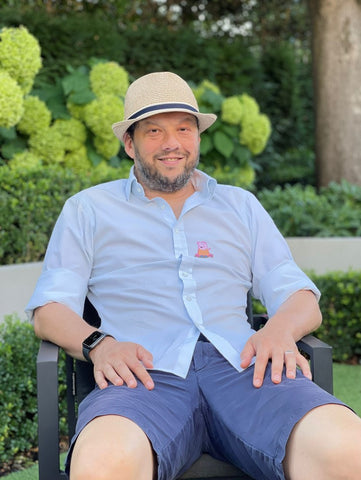
Neil tells his story…
Since early December 2020 I’d been having lightheaded moments. Often if I’d been doing something I’d need to sit down, and it was followed by a strong sense of smell.
“I’d smell something that clearly wasn’t there, lasting for about 10 seconds or so.”
I’d had high blood pressure and high cholesterol in the past and my grandfather died of a heart attack at 60 so I decided to get checked out. I had blood tests and a scan using dye to check for blockages and narrowing of veins, and the next day I was told ‘there’s nothing seriously wrong with any of your bloods but when we followed them through your body we found a small lesion on your temporal lobe’.
I’d been more concerned about having a blood blockage that would lead to a heart attack or stroke, so when I found out I had a brain tumour it was a shock. Despite this I was ready for battle and felt as optimistic as I possibly could because it was so small, only 1cm.
“I’d heard of people having plum or apple-sized tumours and I had a pea, so I thought ‘I have a pea, I can do this’.”
I went to see a neurologist who looked at my scans and said ‘that’s where it is’. He wanted to take it out on 8 February 2021 and explained how he was going to do it. He couldn’t say how long it had been there but it hadn’t grown from the time of my first scan to the day before surgery, so that was promising.
I think it was a Monday morning that I checked myself into The Wellington Hospital in North London and, at lunchtime, off I went for brain surgery. As far as my surgeons could tell, they’d removed it all and, despite feeling a bit sore on the side of my head, I felt surprisingly OK.
A biopsy of my tumour was sent to pathology and identified it as a possible pilocytic astrocytoma, but low-grade. However, the cells around it came back showing a mutated gene more commonly found in aggressive high-grade diffuse midline gliomas, or DIPG, more frequently found in the young.
“That it was in my much older brain and in the wrong place left the medical team surprised.”
After surgery I was sent to oncology to start treatment because the cells found, while possibly dormant, could just have easily been aggressive. The London Clinic, in Central London, treated it as a fairly aggressive tumour with six weeks of radiotherapy and chemotherapy. Then, at the end of April, I started six cycles of chemo which involved five days of pills followed by a 23-day break and then the cycle started again.
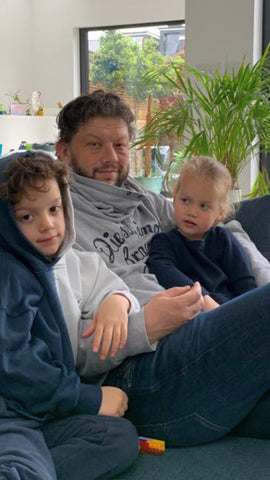
At the time, I took comfort in knowing my family’s history. I was born in South Africa but my parents, both doctors, emigrated to England to escape apartheid. My mum had breast cancer around 16 years ago and is still all clear and my father passed away during the pandemic but had previously had kidney cancer, which spread to his brain as a secondary cancer in 1997.
“It’s obvious I’m from strong stock and I couldn’t help but feel if my dad had a brain tumour at 65 and beat it then I had a good chance of beating mine too.”
I also felt fortunate my kids were too young to understand what was going on, Henry was six and Millie was just three. I think it was hardest on my wife, Victoria because, as the person going through it, I had the ability to manage my own mind. I assumed if the feelings I had previously returned then I’d know my tumour was back. I decided I wouldn’t worry too much about what might happen but deal with it as and when it did.
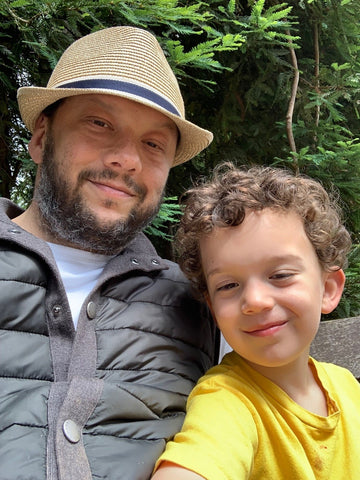
“That moment arrived during a routine scan in January 2023, when signs of regrowth were detected.”
I was recommended for surgery again, so, after having pre-surgical tests and evaluations, on February 18 I went under the knife, this time at the Cleveland Clinic London. Having spoken to my surgeon beforehand, I, an Arsenal fan, had established he supported Liverpool. There was an Arsenal match on during my surgery so I asked, if I had to have an awake craniotomy, if he could put that on, but he told me I’d be sedated throughout. When I woke up after surgery, the first thing I asked for was the score, and I was happy to hear we’d won.
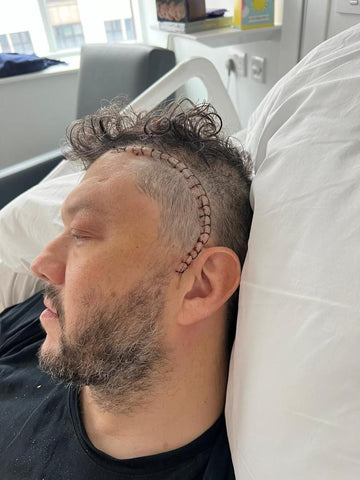
“The surgery itself went really well but I did suffer some post-op complications.”
At the Cleveland Clinic, there’s an MRI scanner in the operating theatre, so my surgeons were able to check they’d got everything they wanted before closing me up. Frustratingly though, after surgery I had problems with my brain swelling. My head was visibly swollen until April, so for around six weeks. I had to wear tight patches to, essentially, squash it and bring the swelling down. Operating on it would have meant wearing a drain for an extended period of time, so the patches were my best option. I still have a tiny indentation near my cheek bone, but nothing anyone would really notice.
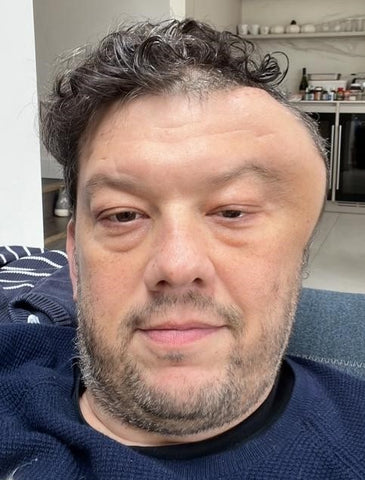
In May I started 12 cycles of temozolomide (TMZ) chemotherapy. It wasn’t long after that I suddenly became unable to walk properly and lost the use of my right arm. I found my right leg would bang into things even though I could see them and I wasn’t able to use my hand to cut food or lift a cup to drink from. I hadn’t fallen or had a big impact injury but a scan revealed I was suffering from a brain haemorrhage. I was assured it wasn’t caused by the chemotherapy but it was putting a lot of pressure on my brain. I, therefore, needed another surgery, which involved a burr hole being made in my skull to drain the blood.
“By that night my mobility was much improved and I was also able to use my right hand to cut my dinner.”
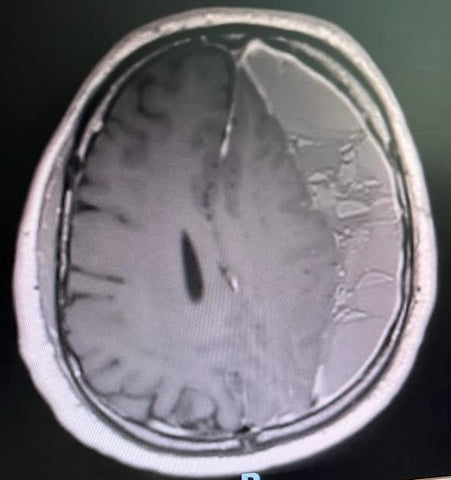
My first follow-up scan showed the bleed had gone, but another one in August showed a few specks of something. I was told these could have been signs of regrowth or that my immune system was operating well post-bleed. Thankfully these were gone by my last scan in September, so I’m now feeling more normal and able to exercise again.
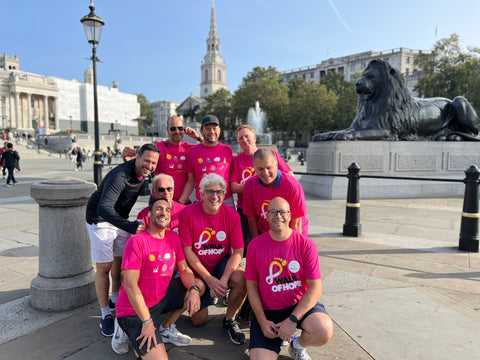
I did a half-marathon parks challenge with some really good friends, who used to drive me to my radiotherapy sessions and then walk around Regent’s Park, for my first Walk of Hope in 2021, raising £16,900. I didn’t have as much time this year but I wanted to support the event again so I organised a 14km walk for the nine of us, which took us from Hyde Park to Primrose Hill via Regent’s Park. It was great taking in the beauty of London in the autumn sunshine and we’ve almost hit my £15,000 fundraising target.
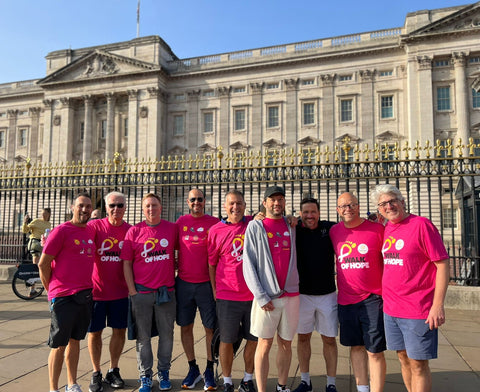
“I hope the money we’ve raised will be life-changing and will help make a difference for everyone going forward who has what I have.”
We need better treatments and more studies into this disease. What Brain Tumour Research does is amazing, in trying to find a way to reduce future caseloads, and I know every penny counts, especially since visiting the charity’s Centre of Excellence at Queen Mary University of London in February.
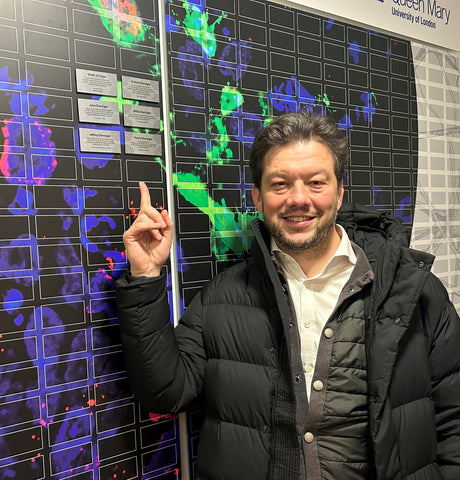
Neil Danziger
October 2023
Brain tumours are indiscriminate; they can affect anyone at any age. What’s more, they kill more children and adults under the age of 40 than any other cancer... yet just 1% of the national spend on cancer research has been allocated to this devastating disease.
Brain Tumour Research is determined to change this.
If you have been inspired by Neil’s story you may like to make a donation via www.braintumourresearch.org/donate or leave a gift in your will via www.braintumourresearch.org/legacy
Together we will find a cure

